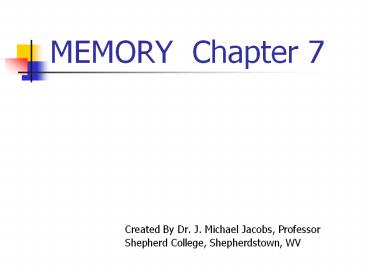MEMORY Chapter 7 - PowerPoint PPT Presentation
1 / 12
Title: MEMORY Chapter 7
1
MEMORY Chapter 7
- Created By Dr. J. Michael Jacobs, Professor
- Shepherd College, Shepherdstown, WV
2
Three Parts of MEMORY
- Experience Unless something was first
experienced, it cannot be remembered Sensations
leave a trace or schema - Storage Encoding or a systematic change is
needed to place in storage - Retrieval Decoding or the ability to pull
something out of storage - RETENTION is The PROOF of Memory
3
THREE Forms of Storage
- Short Term Sensory Store the sensory trace,
lasts less than a SECOND, if not further
processed is forgotten. If put through Perceptual
Systems it moves togt - Short Term Memory (Working Memory) Max Cap. 7
Bits. If Rehearsed (Maintenance or Elaborative)gt - Long Term Memory Unlimited Capacity, anything
past 60 secs. Stored as Network (Kicking) or Set
(Kick Ball)based on Meaningfulness. REQUIRES
CHOICE!
4
THREE Forms Long Term Memory
- Declarative - You understand and can TELL how to
do it (Kicking - in Kick Ball) - Procedural - You understand and can DO it (You
can now demonstrate the Kick Ball kick) - Schematic/Rule - You understand the CONCEPTS
associated with it and can ajust depending on
circumstances (Given a football or soccer ball
you can kick these different ways)
5
Storage Processes
- Storage influences retrieval (The Better stored,
the better and easier retrieved) - Association Bonds Practice Memory but it is
specific. Kick Ball that form only - Active Organizations 1. LEVEL is based on how
often used. The more often used the Higher in the
memory bank. 2. Schema or Rule (Kicking -the how
is determined by the situation) requires deeper
concept knowledge but allows for easier later
adaptation - WE CHOOSE HOW WE STORE THINGS!
6
Retrieval
- Recall Action produced from memory (Ball is for
kicking as practiced) - Recognition Link with learned context
(Speedball - Ball can be dribbled, kicked,
passed, trapped, or caught) - FACTORS that affect Recall
- Encoding Specificity
- Reconstruction of Events
- Elaborative Rehearsal
7
Forgetting
- There are 3 Reasons for Forgetting
- Decay Lack of use. This is Natural, BUT does
not apply to MOTOR SKILLS - Interference Proactive/retroactive the more
like the original the more it affects remembering
(3 of something) again, not as much in the
psychomotor realm - SIMPLY CANT FIND IT!!
8
Retrieval Cues Issues
- Learning within a SPECIFIC environment affects
later memory (where was I/it) - PRACTICE as close to REAL CONDITIONS as possible
(Closed to Open) - You KNOW more than you can Remember
- Serial recall (Recency/Primacy Effect) Keep
things to about SIX issues, also are affected by
Proactive/Retroactive effects of each other
9
Minimizing Forgetting
- CHUNKING Two Meanings A Cue replaces an
entire concept or set of things (Stance Head to
toe body positioning), OR Learn 1st thing, add
next, and next. (Basis of Phone/SS Number
Memory) - ANOLOGIES Use of Picture or Common idea (10 to
2 casting, Sweep the table Frisbee Toss, Hammer
the cast) concepts - The more OFTEN something is used!
10
Important Issues
- ALL experiences, once remembered provide
Building Blocks for future learnings. Each
practice day improves the level of performance
and allows one to begin at that higher level - Because Psychomotor Learning affects all 3
Domains of Learning, we remember more Skills and
Concepts
11
Important Issues Continued
- Practice should be Structured to reduce
interference (Plan so that two things that are
similar are temporally separated), decay (Daily
repeats of basics), and improve context issues
(Add something new to expand the total concept)
Example Teaching Speedball - When cues are repeated as the steps are done, a
deeper memory is created (Declaring and Doing are
linked) structure for success, and all three
domains amplify the memory process!
12
END of Chapter 7































